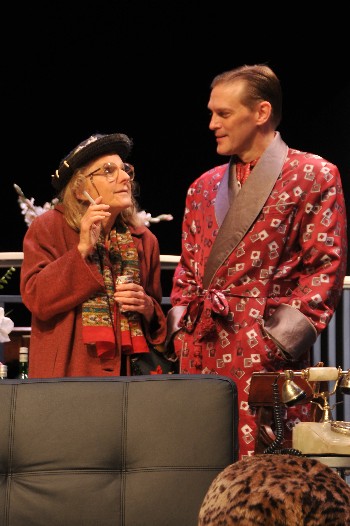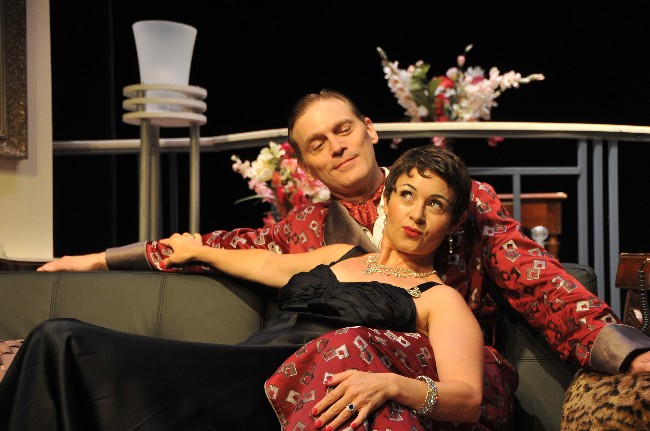Theater Review: A Sweet and Contagious “Present Laughter”
Actor Jack Koenig never flags in the Peterborough Players production of Present Laughter, and around him in his London studio-flat swirls a churning world of impertinent employees and past and present loves that would do Kaufman and Hart proud.
Present Laughter by Noel Coward. Directed by Gus Kaikkonen. Staged by the Peterborough Players, Peterborough, New Hampshire, through August 26.
By Jim Kates

Dale Hodges and Jack Koenig in the Peterborough Players production of PRESENT LAUGHTER. Photo: Deb Porter-Hayes.
In Shakespeare’s Twelfth Night, the fool Feste gets called upon for a song by a trio of tipsy roisterers. He asks, “Would you have a love-song, or a song of good life?” and is answered: a love-song. A different kind of fool adds, “I care not for good life.”
The population of Noel Coward’s 1939 comedy Present Laughter also cares far more for love than for a good life, and the play takes its title and its burden from the song that Feste sings: “What is love? ‘Tis not hereafter; Present mirth hath present laughter, What’s to come is still unsure.” The most serious question that gets asked in the play is perhaps, “How old are you?” It resonates behind much of the action on stage, but so far behind that we don’t worry much about it.
Youth’s a stuff will not endure. Garry Essendine (Jack Koenig) knows that—a romantic actor edging into his forties, “advancing with every sign of reluctance into middle age,” he flails about in what we now call a mid-life crisis with an odd assurance that carries him through quite nicely, Jack. It’s an exceeding talky role, especially in the first act, and grueling throughout for a real-life actor with an almost constant on-stage presence. Koenig never flags in the current Peterborough Players production, and around him in his London studio-flat swirls a churning world of impertinent employees and past and present loves that would do Kaufman and Hart proud—everything but the penguins. Gus Kaikkonen, the director of Present Laughter, serves as an effective traffic cop keeping everything moving at once in the right directions at the allowable speed limit. (He also pops the scene forward in time 15 years to 1954.) Kaikkonen is ably backed up here by the precise and lively lighting of Kevin Frazier and the remarkably à propos, interpolated musical numbers composed mostly by Ellen Mandel, which, eventually, the entire cast gets to sing both high and low.
There’s a lot to keep track of. It’s a full cast featuring some of the Peterborough Players’ most familiar faces. We have Karen Peakes, sparkling as usual but a tad subdued as the 21-year-old Daphne Stillington. Dale Hodges moves from an eccentric, spiritualist, Scandinavian housekeeper to an unexpected cameo as Lady Saltburn and back again. Lisa Bostnar comes on steadfastly steady as the not-quite-ex Mrs. Essendine, exuding a kind of real-world sensibility the other characters bump up against and bounce back, a version on stage of the traffic-cop director. Kraig Swartz (once again!) projects enthusiasm in the most frightening form of an intrusive, young acolyte hanging not quite breathlessly on Essendine’s every fulmination. Sevanne Martin makes the comic vamping of a wild-card wife all the more witty by showing cleverly how hard the vamp is working at it, making her deflation inevitable. And Bridget Beirne as Essendine’s secretary has all the best lines to deliver in the second act, the anchor on this ship of fools. Hovering on the rails are Leon Axt as Essendine’s valet, Wayne Asbury as his discreetly tippling agent, and Timothy Clark as his sober producer.

Jack Koenig and Sevanne Martin in the Peterborough Players production of PRESENT LAUGHTER. Photo: Deb Porter-Hayes
Journeys may end in lovers’ meeting, as Feste’s song has it. Present Laughter ends with lovers parting and and a journey beginning, and somehow it all feels all right. There is no redeeming social significance or moral flourish to spoil the moment.
A tang of outright farce explicitly flavors this comedy of manners gone haywire—quite literally, with the wry remark, “It’s all very fragrant.” Trademark Noel Coward lines—“ There’s something awfully sad about happiness”—don’t need to stand out in the mix. They’re well cooked in. Present Laughter can be read—the program notes for this production notes suggest this—as an autobiographical pièce à clé sending up Coward’s own circle, and that might have delighted the audience of his time. (Coward was about the same age as Essendine when the play appeared.) The playwright died in 1973.
But there is no need to invoke the past or to rely on knowing winks these couple of weeks at the Peterborough Players. Present mirth hath present laughter—very sweet, and contagious, i’ faith.
